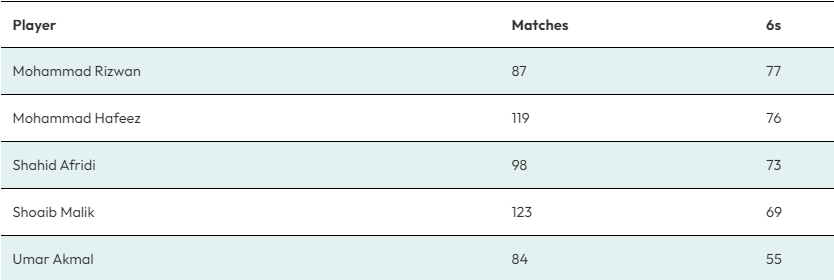During the recent 2nd T20I match against New Zealand at Seddon Park in Hamilton, Mohammad Rizwan, Pakistan’s vice-captain and wicketkeeper-batsman, made history by setting a new T20I record for the national team.
He became the player with the highest number of sixes in the T20I format for Pakistan. This milestone was achieved on Sunday when Rizwan hit his 77th six while facing Tim Southee in the very first over of the innings, as Pakistan chased a target of 195. With this accomplishment, Rizwan surpassed former Pakistan captain Mohammad Hafeez, who now holds the second position on the list with 76 sixes in T20Is.
🚨 RECORD ALERT @iMRizwanPak is now the leading six-hitter for 🇵🇰 in T20Is 💪#NZvPAK | #BackTheBoysInGreen pic.twitter.com/9e71hOuqTj
— Pakistan Cricket (@TheRealPCB) January 14, 2024
Regarding the game, Pakistan experienced a 21-run loss to New Zealand in the second T20I of the five-match series. Rizwan’s innings began impressively with a six against Tim Southee, but his early departure in the second over, courtesy of Adam Milne, limited his contribution to just 7 runs. Chasing a target of 195 runs posed a challenge for Pakistan. Babar Azam and Fakhar Zaman formed a crucial partnership, adding 87 runs to the team’s total. Despite their efforts, victory remained elusive. Fakhar’s exit after scoring 50 runs left Pakistan in a precarious position.

The middle-order batsmen, including Iftikhar Ahmed and Azam Khan, failed to provide the necessary finish as they were dismissed early. Babar Azam emerged as the sole warrior, guiding the batting lineup with a positive display, scoring 66 runs. However, his commendable effort couldn’t secure a win. Babar Azam’s dismissal in a crucial moment shattered hopes, leading to Pakistan being bowled out for 173 runs in 19.3 overs. Consequently, the home side has taken a formidable 2-0 lead in the 5-match T20I series. Pakistan now stands on the brink of losing the series unless they secure a win in the upcoming game.
- Misleading Video Alters Prime Minister Shehbaz’s Speech Targeting Political Rival, Not His Party - 21/04/2024
- ATC Grants Three-Day Remand for Suspects in Ichhra Bazaar Harassment Case - 19/03/2024
- Pakistan, India, and Bangladesh Lead World in Severe Smog Crisis, Exceeding WHO Guidelines - 19/03/2024


